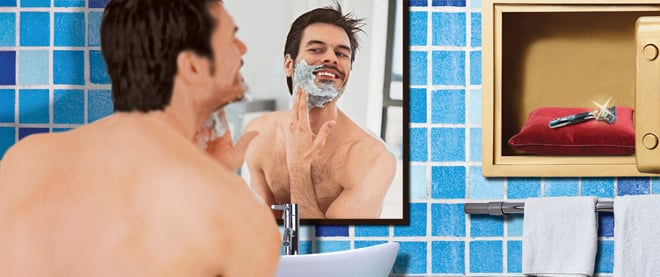The Dollar Shave Club’s pitch is smooth, and razor sharp
Cutting out high-paid pitchmen gets members their razors and blades for cheap
Share

Michael Dubin starts his pitch sitting at a desk and telling it like it is: for $1 (plus $2 shipping), he will mail you a basic razor and five twin-blade heads every month. His dollarshaveclub.com, an online company based in Santa Monica, Calif., offers two things his competitors can’t: convenience and low cost. The no-frills approach also extends to his advertising: Dubin spent just $4,500 to make a video that went viral last week, in which he takes the viewer on a tour of his warehouse. “Do you like spending $20 a month on brand-name razors? Nineteen go to Roger Federer,” he says. “And do you think your razor needs a vibrating handle, a flashlight, a backscratcher and 10 blades? Your handsome-ass grandfather had one blade.”
Dubin, who studied improv and sketch comedy, wrote the script himself. A friend directed the video, which also features a packing assistant, a friend’s daughter and a man in a bear suit. Props include a machete, a leaf blower and a forklift. His main message? “Stop paying for shave tech you don’t need.” What he didn’t expect was three million hits on YouTube in just one week. “We wildly underestimated how big the video would get,” said Dubin.
Certainly bigger than shaving giant Gillette’s latest ad, which got a little more than 150,000 hits when posted on YouTube. It first aired during the Super Bowl, where a 30-second spot reportedly costs $3.5 million. Instead of the regular lineup of athletic pitchmen such as Federer, David Beckham and Tiger Woods, the commercial featured Outkast’s André 3000 and actors Adrien Brody and Gael García Bernal as “masters of style.” After primping at home the trio head out on the town, where they immediately turn female heads. Gillette got more buzz last June, just before Wimbledon, when it videotaped the creation of a giant portrait of Federer in a grass field near London and posted it on YouTube. The company covered the beard in 1,000 litres of foam, then used lawn mowers to shave it off.
But the advertising lengths to which Gillette and rival Schick go only underscore how competitive the business is. People shave their faces, armpits and legs on a daily basis, paying between $15 and $20 a month for a pack of four or five replacement blades, not to mention $25 or more for a new razor model, which usually comes with one or two blades. Indeed, razor blades are so expensive they are among the top five items ripped off from stores along with laptops, smartphones and booze, according to the non-profit National Association of Shoplifting Prevention in the U.S. (That’s why they’re often behind a counter, a locked glass window or a plastic barrier that sounds an alarm when you take a pack off the shelf.) It all adds up to a market worth an estimated $2.6 billion, and ruled by the big two. So while Dubin may be a funny man and his commercial an overwhelming Internet hit, can the Dollar Shave Club compete?
Perhaps, if consumers like Steven Frost, a 35-year-old real estate development consultant in Toronto, are any indication. Frost’s five o’clock shadow means he sometimes shaves twice a day; he goes through two blades a week. He says the prices for shaving items are ridiculous. “It could be made for pennies,” he complains of the plastic and metal bits.
Dubin, who started his company with $1 million from investors such as former MySpace CEO Michael Jones through the venture capital studio Science Inc., won’t say how much the Dollar Shave Club spends on its razors and blades or where they are made. But he says he can offer a cheaper price because he’s cutting out expensive pitchmen, or what he calls “over-marketing.”
As well as his basic package, he charges $6 a month for the four-blade 4X (recommended for guys and girls) and $9 for the six-blade Executive, which comes with a lubricating strip, pivot head and “wave fins” to bring the hair up. “Racket is a pretty strong word,” he says of his competitors’ prices, “but I think they overcharge for their products.” Will the Dollar Shave Club subscription be extended to Canadians? Dubin says he is definitely expanding. By May, he expects we will be able to pick up razors from our mailboxes. Now that’s a close shave.